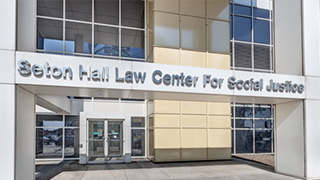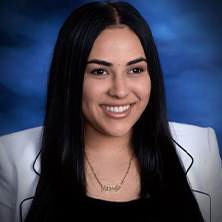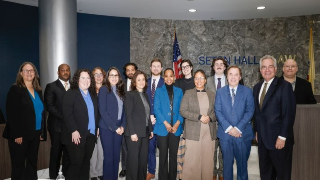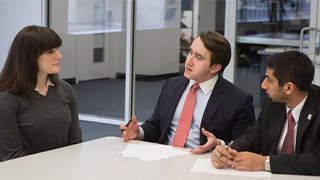 The Center for Social Justice (CSJ) at Seton Hall University School of Law, in collaboration
with Make the Road New Jersey (MRNJ), hosted a two-day clinic as part of the Deferred
Action for Labor Enforcement (DALE) project. DALE is a new immigration policy that
allows undocumented workers to seek employment authorization in order to assist federal
and state labor and employment agencies with their investigation of workplace labor
and wage violations. Professor Lori A. Nessel, director of the Immigrants’ Rights/
International Human Rights Clinic at the CSJ oversaw the clinic and 8-10 Seton Hall
Law clinic students assisted clients each day with DALE applications. Additional
law school students served as interpreters. Professor Nessel remarked, “we were able
to assist 27 workers in seeking lawful employment authorization. With the legal right
to work in the U.S., these individuals will now be better able to avail themselves
of the fair wages and working conditions that are guaranteed to all employees.” Yaneydis
Rodriguez, Natalia Bartolome, Melanie Egas, and Joseph LaForte (all 3L’s) served as
lead organizers of the clinic, with active involvement from their fellow 3L students
in the Immigrants’ Rights/International Human Rights Clinic.
The Center for Social Justice (CSJ) at Seton Hall University School of Law, in collaboration
with Make the Road New Jersey (MRNJ), hosted a two-day clinic as part of the Deferred
Action for Labor Enforcement (DALE) project. DALE is a new immigration policy that
allows undocumented workers to seek employment authorization in order to assist federal
and state labor and employment agencies with their investigation of workplace labor
and wage violations. Professor Lori A. Nessel, director of the Immigrants’ Rights/
International Human Rights Clinic at the CSJ oversaw the clinic and 8-10 Seton Hall
Law clinic students assisted clients each day with DALE applications. Additional
law school students served as interpreters. Professor Nessel remarked, “we were able
to assist 27 workers in seeking lawful employment authorization. With the legal right
to work in the U.S., these individuals will now be better able to avail themselves
of the fair wages and working conditions that are guaranteed to all employees.” Yaneydis
Rodriguez, Natalia Bartolome, Melanie Egas, and Joseph LaForte (all 3L’s) served as
lead organizers of the clinic, with active involvement from their fellow 3L students
in the Immigrants’ Rights/International Human Rights Clinic.

Yaneydis Rodriguez 3L
Reflecting on the experience, Rodriguez emphasized the diversity of the individuals served, stating, “we [assisted] hard-working immigrants from a variety of countries, age groups, and duration in the United States.” She further highlighted the rewarding nature of offering a pathway to employment authorization, even if temporary. Egas shared a touching moment from the clinic where a worker expressed gratitude for “being his voice” and for “bringing light to a horrible time in his life,” emphasizing the transformative impact of legal advocacy.

Melanie Egas 3L
Echoing this sentiment, Egas described participating in the DALE clinic as the most rewarding experience of her law school journey. She emphasized the importance of obtaining work authorization, stating, “a work authorization is something many people take for granted, yet something that is life-changing for others.” The dedication of professors, students, and volunteers exemplify the power of collective action in advancing justice and equality for undocumented workers.
For more information, please contact:
Seton Hall Law School







